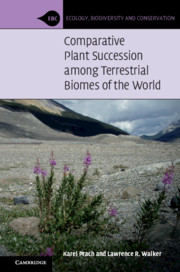Book contents
- Comparative Plant Succession among Terrestrial Biomes of the World
- Ecology, Biodiversity, and Conservation
- Comparative Plant Succession among Terrestrial Biomes of the World
- Copyright page
- Contents
- Preface
- 1 Introduction
- Part I Plant Succession and Biomes
- Part II Succession by Disturbance Type
- 4 Comparative Approach
- 5 Volcanoes
- 6 Glaciers
- 7 Cyclones
- 8 Dunes
- 9 Landslides
- 10 Floods
- 11 Fire
- 12 Clearcuts
- 13 Plowed Fields
- 14 Mines
- 15 Other Disturbances
- Part III Synthesis
- Book part
- References
- Index
11 - Fire
from Part II - Succession by Disturbance Type
Published online by Cambridge University Press: 08 May 2020
- Comparative Plant Succession among Terrestrial Biomes of the World
- Ecology, Biodiversity, and Conservation
- Comparative Plant Succession among Terrestrial Biomes of the World
- Copyright page
- Contents
- Preface
- 1 Introduction
- Part I Plant Succession and Biomes
- Part II Succession by Disturbance Type
- 4 Comparative Approach
- 5 Volcanoes
- 6 Glaciers
- 7 Cyclones
- 8 Dunes
- 9 Landslides
- 10 Floods
- 11 Fire
- 12 Clearcuts
- 13 Plowed Fields
- 14 Mines
- 15 Other Disturbances
- Part III Synthesis
- Book part
- References
- Index
Summary
Fire represents one of the most heterogeneous disturbances that we consider. Fires differ greatly in their intensity, frequency, and spatial extent. We consider here only intense fires where most aboveground biomass is consumed by fire. We focus on succession after a single fire and consider repeated fires as initiating separate seres. However, the frequency of fire in the past and the fire return interval (McKenzie et al., 2011) are important factors that influence the course of succession by altering local and regional species pools (Settele et al., 1996) and local site conditions (Johnstone & Chapin, 2006). Succession in ecosystems that are fire adapted differs from those that are not (Johnson, 1995) because in the former, there are species adapted to either survive the fire in situ or easily colonize the site immediately after the fire. Ecosystem adaptations to fires can occur over millions of years (Korasidis et al., 2016). Post-fire succession is usually considered as a type of secondary succession (Walker & del Moral, 2003), but in the case of highly intense fires where all biological components, including litter and humus layer, are burned, the recovery approaches primary succession.
- Type
- Chapter
- Information
- Publisher: Cambridge University PressPrint publication year: 2020

